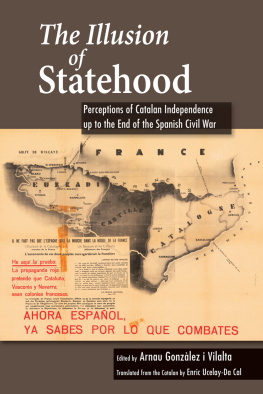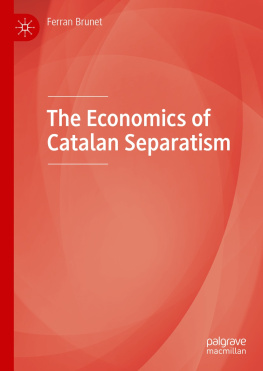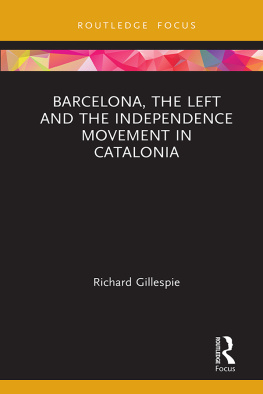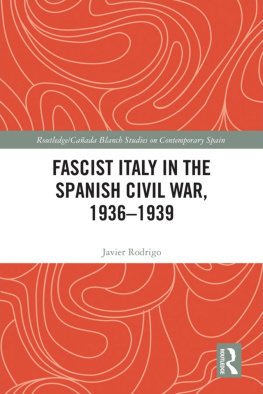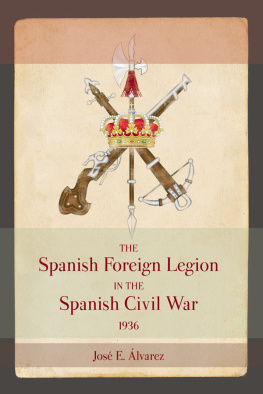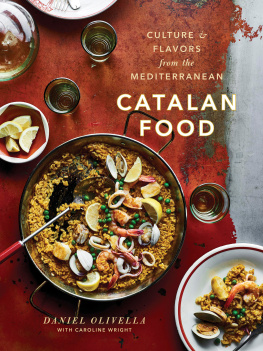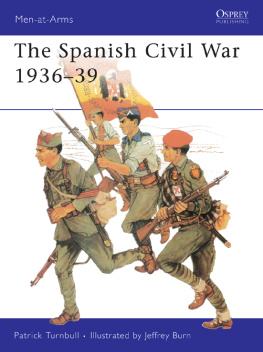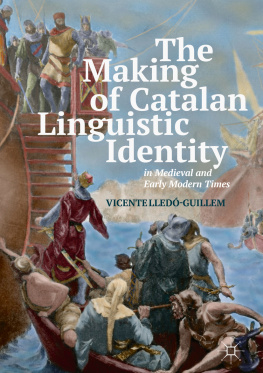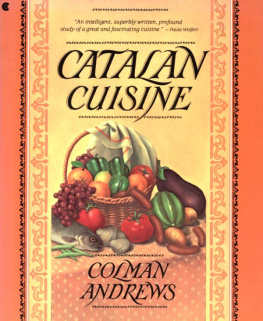
The Illusion
of
Statehood
Perceptions of Catalan Independence
up to the End of the Spanish Civil War
The Illusion
of
Statehood
Perceptions of Catalan Independence
up to the End of the Spanish Civil War
Edited by Arnau Gonzlez i Vilalta
Translated from the Catalan by Enric Ucelay-Da Cal

Organization of this volume, copyright Arnau Gonzlez i Vilalta, 2020;
all chapters copyright Sussex Academic Press, on behalf of the individual authors.
Published in the Sussex Academic e-Library, 2019.
SUSSEX ACADEMIC PRESS
PO Box 139, Eastbourne BN24 9BP, UK
Ebook editions distributed worldwide by
Independent Publishers Group (IPG)
814 N. Franklin Street
Chicago, IL 60610, USA
ISBN 9781845199692 (Paperback)
ISBN 9781782846222 (Epub)
ISBN 9781782846239 (Kindle)
ISBN 9781782846246 (Pdf)
All rights reserved. Except for the quotation of short passages for the purposes of criticism and review, no part of this publication may be reproduced, stored in a retrieval system, or transmitted, in any form or by any means, electronic, mechanical, photocopying, recording or otherwise, without the prior permission of the publisher.
British Library Cataloguing in Publication Data
A CIP catalogue record for this book is available from the British Library.
This e-book text has been prepared for electronic viewing. Some features, including tables and figures, might not display as in the print version, due to electronic conversion limitations and/or copyright strictures.
The Caada Blanch / Sussex Academic Studies on Contemporary Spain
General Editor: Professor Paul Preston, London School of Economics
A list of all published titles in the series is available on the Press website. More recently published works are presented below.
Concha Alborg, My Mother, That Stranger: Letters from the Spanish Civil War.
Peter Anderson, Friend or Foe?: Occupation, Collaboration and Selective Violence in the Spanish Civil War.
Germ Bel, Disdain , Distrust, and Dissolution: The Surge of Support for Independence in Catalonia.
Carl-Henrik Bjerstrm, Josep Renau and the Politics of Culture in Republican Spain, 19311939: Re-imagining the Nation.
Claudio Hernndez Burgos (ed.), Ruptura: The Impact of Nationalism and Extremism on Daily Life in the Spanish Civil War (19361939).
Darryl Burrowes, Historians at War: Cold War Influences on Anglo-American Representations of the Spanish Civil War.
Andrew Canessa (ed.), Barrier and Bridge: Spanish and Gibraltarian Perspectives on Their Border.
Kathryn Crameri, Goodbye, Spain?: The Question of Independence for Catalonia.
Pol Dalmau, Press, Politics and National Identities in Catalonia: The Transformation of La Vanguardia , 18811931.
Mark Derby, Petals and Bullets: Dorothy Morris A New Zealand Nurse in the Spanish Civil War.
Francisco Espinosa-Maestre, S hoot the Messenger?: Spanish Democracy and the Crimes of Francoism From the Pact of Silence to the Trial of Baltasar Garzn.
Mara Jess Gonzlez, Raymond Carr: The Curiosity of the Fox.
Helen Graham, The War and its Shadow: Spains Civil War in Europes Long Twentieth Century.
Arnau Gonzlez i Vilalta (ed.), The Illusion of Statehood: Perceptions of Catalan Independence up to the End of the Spanish Civil War.
Xabier A. Irujo, GERNIKA: Genealogy of a Lie.
Mandie Iveson, Language Attitudes, National Identity and Migration in Catalonia: What the Women Have to Say
Angela Jackson, For us it was Heaven: The Passion, Grief and Fortitude of Patience Darton From the Spanish Civil War to Maos China.
Gabriel Jackson, Juan Negrn: Physiologist, Socialist and Spanish Republican War Leader.
Nathan Jones, The Adoption of a Pro-US Foreign Policy by Spain and the United Kingdom: Jos Mara Aznar and Tony Blairs Personal Motivations and their Global Impact.
Xavier Moreno Juli, The Blue Division: Spanish Blood in Russia, 19411945.
David Lethbridge, Norman Bethune in Spain: Commitment, Crisis, and Conspiracy.
Antonio Miguez Macho, The Genocidal Genealogy of Francoism: Violence, Memory and Impunity.
Carles Manera, The Great Recession: A Subversive View.
Nicholas Manganas, Las dos Espaas: Terror and Crisis in Contemporary Spain.
Jorge Marco, Guerrilleros and Neighbours in Arms: Identities and Cultures of Antifascist Resistance in Spain.
Emily Mason, Democracy, Deeds and Dilemmas: Support for the Spanish Republic within British Civil Society, 19361939.
Soledad Fox Maura, Jorge Semprn: The Spaniard who Survived the Nazis and Conquered Paris.
Martin Minchom, Spains Martyred Cities: From the Battle of Madrid to Picassos Guernica.
Olivia Muoz-Rojas, Ashes and Granite: Destruction and Reconstruction in the Spanish Civil War and Its Aftermath.
Linda Palfreeman, Spain Bleeds: The Development of Battlefield Blood Transfusion during the Civil War.
Fernando Puell de la Villa and David Garca Hernn (eds.), War and Population Displacement: Lessons of History.
Rben Serm, Conspiracy, Coup dtat and Civil War in Seville, 19361939: History and Myth in Francoist Spain.
Maggie Torres, Anarchism and Political Change in Spain: Schism, Polarisation and Reconstruction of the Confederacin Nacional del Trabajo , 19391979.
Dacia Viejo-Rose, Reconstructing Spain: Reconstructing Spain: Cultural Heritage and Memory after Civil War.
Antoni Vives, SMART CITY Barcelona: The Catalan Quest to Improve Future Urban Living.
Contents
The Caada Blanch Centre for Contemporary Spanish Studies
In the 1960s, the most important initiative in the cultural and academic relations between Spain and the United Kingdom was launched by a Valencian fruit importer in London. The creation by Vicente Caada Blanch of the Anglo-Spanish Cultural Foundation has subsequently benefited large numbers of Spanish and British scholars at various levels. Thanks to the generosity of Vicente Caada Blanch, thousands of Spanish schoolchildren have been educated at the secondary school in West London that bears his name. At the same time, many British and Spanish university students have benefited from the exchange scholarships which fostered cultural and scientific exchanges between the two countries. Some of the most important historical, artistic and literary work on Spanish topics to be produced in Great Britain was initially made possible by Caada Blanch scholarships.
Vicente Caada Blanch was, by inclination, a conservative. When his Foundation was created, the Franco regime was still in the plenitude of its power. Nevertheless, the keynote of the Foundations activities was always a complete open-mindedness on political issues. This was reflected in the diversity of research projects supported by the Foundation, many of which, in Francoist Spain, would have been regarded as subversive. When the Dictator died, Don Vicente was in his seventy-fifth year. In the two decades following the death of the Dictator, although apparently indestructible, Don Vicente was obliged to husband his energies. Increasingly, the work of the Foundation was carried forward by Miguel Dols whose tireless and imaginative work in London was matched in Spain by that of Jos Mara Coll Comn. They were united in the Foundations spirit of open-minded commitment to fostering research of high quality in pursuit of better Anglo-Spanish cultural relations. Throughout the 1990s, thanks to them, the role of the Foundation grew considerably.
Next page
